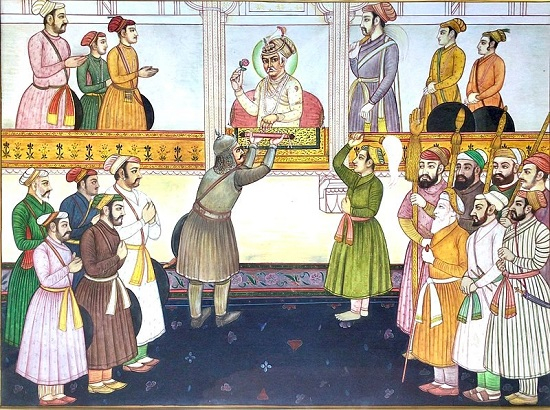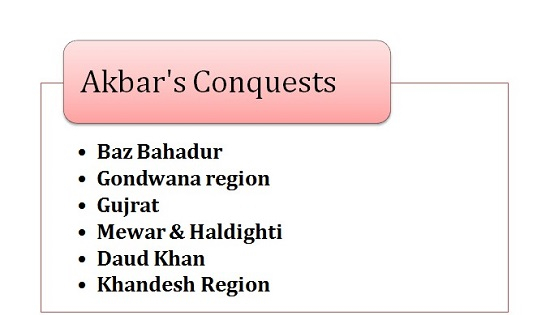

Akbar was the most powerful and popular Mughal empire in the Indian Kingdom. He revoked the Jizya and Pilgrim taxes to make the common people’s life easier. He was closely associated with various knowledgeable Hindu Pandits to learn from them and also appointed them to various important Government positions. He never restricted himself from interactions with the common people and listened to their troubles.
Akbar was the third emperor of the Mughal Empire and was the son of Humayun, also known as the Bairam Khan. He became the emperor at a very early age and his father was dead when he was only thirteen years old. He established the Mughal Empire in a more accurate sense in India, even though his grandfather Babar was the first emperor who colonized the place. Akbar had a strong personality through which he expanded the Mughal Empire all over India.
Akbar always had a keen desire to listen to everyone and learn from them. He was humble and polite which helped him to deal with people and all the other subjects. He is most famous for the ruling techniques that he applied to the country’s wellbeing. He had a simple yet strategic approach to his everyday decision-making.
He travelled among the common people of his empire in a hoax and tried to understand their day-to-day problems. He formed the Centralized Federal Government where the government can delegate the tasks to the state governors of different states. This government formation made the vast land and religious administration simpler for the government.

Akbar’s military conquests started in the year 1562 and he first conquered Baz Bahadur who was the mansadar later in Akbar’s court. He then conquered the Gondwana region in 1564 from Rani Durgavati and Vir Narayan. In 1573, Akbar fought Muzaffar Shah and conquered Gujrat from him. He then made Fathepur Sikri a new capital in the name of his victory.

Akbar’s army defeated Rana Pratap Singh in the year 1576 and the battle of Haldighati. This army was led by Man Singh and this defeat was followed by the defeat of Mewar. The battle of Mewar made the Rajputs realise the power of Akbar. He defeated Daud Khan, the Afghan ruler of Bihar and Bengal in the same year. His forces captured the Khandesh region in the year 1591 and finally, Chand Bibi was able to secure Ahmednagar against the Mughal forces.
Akbar married Raja Bharamal’s daughter and the Rajput princess Jodha Bai, also known as Mariam-uz-Zamani, which played a turning point in Mughal history. He applied various Rajput policies where Rajputs like Raja Bhagwan Das and Raja Man Singh hold dignitary military positions.
He also ruled out and applied various religious policies during his time. He ordered the dismissal of the jizya and pilgrim tax system and he ordered to build of the Ibadat Khana which means the house of worship. The Ibadat Khana was built in Fatehpur Sikri in the year 1575. He invited various scholars into his empire from different religions such as Jainism, Christianity, Hinduism and Zoroastrianism. He spread the philosophy of Sulh-i-Kul which means peace to all.
Akbar created a place where everyone can worship and named it Ibadat Khana. However, he decided to stop the debates that happened in the Ibadat Khana since it created division among religions. Shiek Mubarak was a religious advisor of Akbar and the new religious policy he planned to implement was Abul Faizi. A contemporary author named Badauni was a ruthless critic of Akbar’s religious experiments.
Akbar was able to investigate the land revenue administration with Raja Todar Mal’s help and completed the whole administration in the year 1580. The land revenue system was known as the Zabti or Bandobast System or Dahsala System. Every land can be classified into four categories and these are: Polaj, Parauti, Chachar and Banjar. Polaj lands are capable of cultivating every year; Parauti lands are capable of cultivating once in two years. In addition, Chachar lands can produce corps once in three or four years and Banjar lands can produce corps once in five or more years. The amount of land revenue was fixed as per the average yield in ten years of any land.
Akbar was suffering from dysentery disease that killed him when he was 63. He got buried prestigiously in the Agra fort in the year 1605. His reign established the significance of the Mughal Empire in Indian history. He increased the Mughal Empire and made it wealthy and strong in military force along with various religious and political reforms.
Akbar was the introducer of the Mansabdari system administration during his ruling. The officers of the Mansabdari system had rankings from 10-5000 depending upon their position. He introduced a new land revenue system known as the Bandobast or Dahsala system. He listed the troubles of the common people at Diwan-e-Aam and interacted with various religious scholars such as Hindus, Muslims and Christians to talk about the important matters related to the kingdom in Diwan-e-Khaas.
Q. What was the Mansabdari System?
It was a military system introduced by Akbar where each officer was entitled to a specific rank. Zat and Sawar were the two types at which the ranks were divided.
Q. What was Din Ilahi?
Din Ilahi was a new religion founded by Akbar and the followers of this religion believed in one God. There were a total of 15 followers of this religion including Birbal as Akbar never forced anyone for joining the religion
Q. What was Akbar’s contribution to art and culture?
The masterpieces like Fatehpur Sikri, Agra Fort and Allahabad Fort demonstrate the architectural taste of Akbar. In addition, he was a great poetry and music lover and appointed many poets and singers for his pleasure.